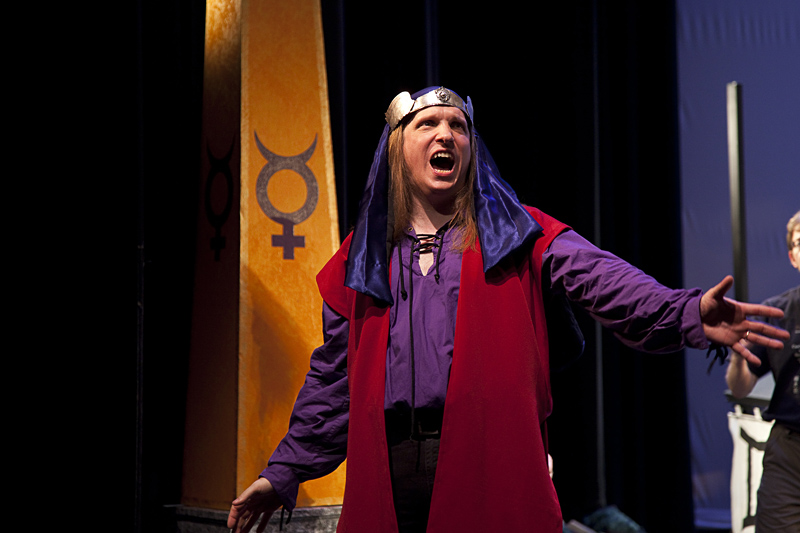Occultist, poet, playwright, and libertine, Aleister Crowley (1875–1947) combined three of his interests—and a bit of the fourth—in his Rites of Eleusis, a cycle of seven mystery plays he wrote and first performed exactly a century ago, in October 1910. Poetic dramas peopled with personified planets and zodiacal signs, voluptuous, prolix, and inscrutable, the Rites have been presented over the years, in varying degrees of elaborateness (from simple group readings on up) by members of the Seattle chapters of Ordo Templi Orientis, the fraternal/spiritual organization founded around 1900 and later headed by Crowley.
He specified only a few bits of incidental music to accompany his spoken script. But Eleusyve Productions founder Jon Sewell got the idea in 2001 to stage all seven with a pop/rock score, envisioning, he says, “a Wagnerian Ring cycle of a rock opera.” He’s now on his fourth in the cycle, The Rite of Mercury.
Sewell’s music is a little bit glam, a bit moody and soulful, equal parts grunge, Godspell, and Queen, and adds a dimension of showmanship to the hieratic texts. As a bonus, singing the words makes them “a thousand times easier to memorize,” says Sewell—a definite boon when confronted with Crowley’s swooning verbiage: “Coelestial, aetherial, inter-aetherial, water-like, air-like, fire-like, earth-like, like unto light, like unto darkness, shining as do the Stars, moist, hot, cold Spirit, hail to Thee, ever laughing Child-God, all-knowing.”
After a successful dry run of the 90-minute, intermissionless show in Portland over Labor Day weekend, Mercury‘s cast of eight, chorus of eight, and four fire-spinners recently gathered in one of the upstairs rooms in Seattle Center’s Center House to polish a few scenes. The opening is a complex, multipart chorus, sung (without conductor) to a pre-recorded backing track. Vocal coach Johanna Steen reminded the singers about round vowels and clean cutoffs, and encouraged more projection, more tone: “More ‘Climb Ev’ry Mountain,’ less Lynyrd Skynyrd.”
The costumes are imaginative, unexpected: For the “Invocation of Thoth,” where Crowley specifies merely robes, two Probationers (assistants in the ritual) appear in silver Spandex, and Sewell, in the central role of Mercury, dons a very Bob Fosse black derby and silver spangled vest. He’s a commanding figure in performance, with long blond hair, strong Nordic features, and an ability to switch his stage demeanor, instantly, from affable and inviting to malevolent that is, well, mercurial. He could be the frontman for a Satanic death-metal band, or Minneapolis’ friendliest kindergarten teacher. (By day, Sewell is a project manager at the Horizon House retirement community; the all-volunteer cast also includes a massage therapist, a Starbucks systems admin, and a 911 operator.)
The scene culminates in a long unison chorus, confidently memorized, and a plaintive viola solo by Sunnie Larsen, a bit reminiscent of some of the somber epilogue music from The Rocky Horror Picture Show. Richard Cardone, as Frater Gemini, begins a stylized fight/dance scene as the music gets hard-rockier and more aggressive. Mercury calls it “the dance of thy Virginal Sister,” which, judging from the overt strutting and hip thrusts Cardone directs toward Larsen as Soror Gemini, is a designation he intends to change.
The trick, as with all slim-budgeted theater, is to create maximum effect with minimum means. Eleusyve’s previous production, the Rite of Venus at Hugo House in 2007, was memorable for a scene in which sea waves were recreated via rippling silken banners filled with flower petals tossed into the air. Here, the spinners bring spectacle to Mercury‘s finale, with colored lights, rather than fire, whirling through the air. Contrary to the implication of their name, Eleusyve’s goal, as the troupe’s website puts it, is to make the work of the much-maligned Crowley “more fully accessible to a broad audience.” And Mercury, their largest and most visible production yet, proves their mission is succeeding.







